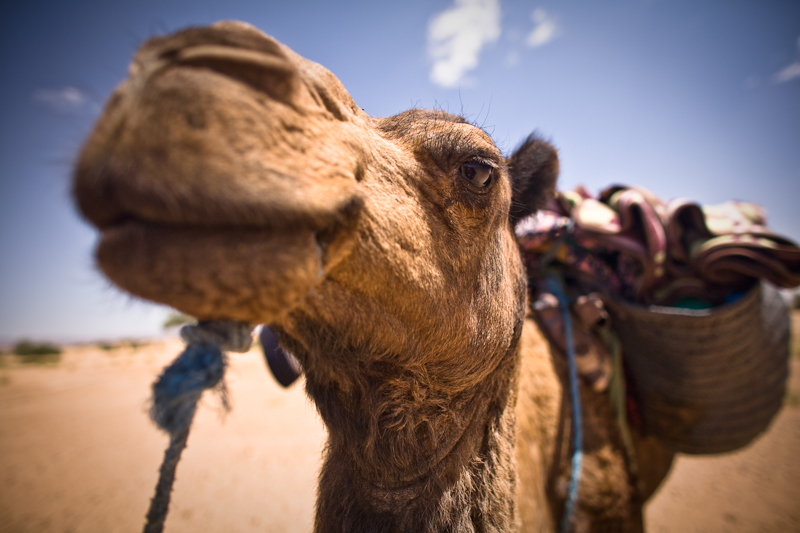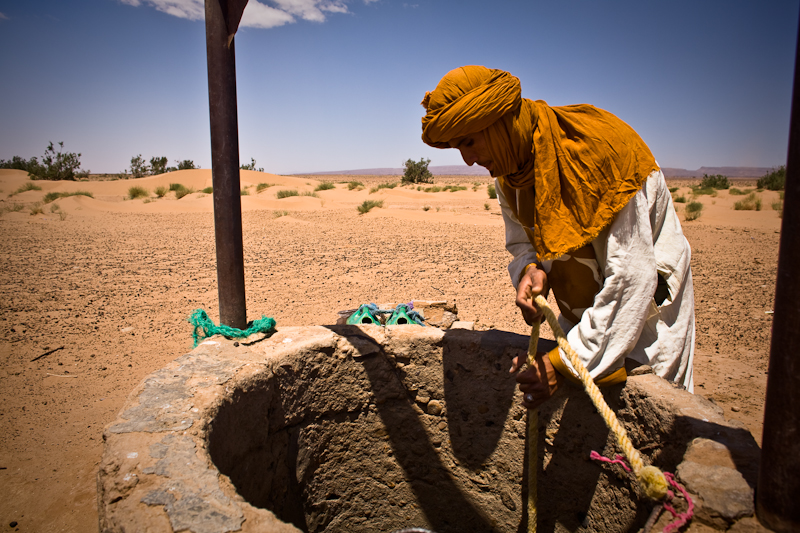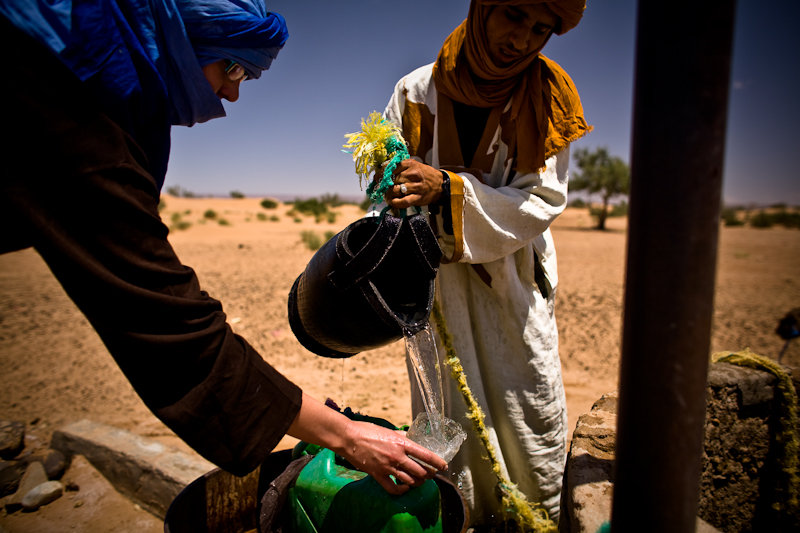Skip to main content
Camel Trekking and Arabic Lessons
Camel Trekking and Arabic Lessonsby Chris Beauchamp Camels!May 14, 2010There is only an hour or two between the previous entry and this one. Since I wrote the last bit, we have eaten the day’s lunch. Rashid prepared and served us what he called “Berber Omelette,” an egg and tomato dish with peppers, onions and the usual spices that was remarkably like Turkish menemen. The camels are nearby, contented from the water we drew from a well right before lunch, and feeding on scraggly shrubs. Rashid is washing the dishes, which generally involves splashing some untreated well-water on everything and sloshing it around a basin. I try not to think that it’s the same basin the camels have drank out of, or that Rashid washed his feet in, or that Laura and I have also used to wash. Desert hygiene is not city hygiene.At least he’s using soap.
Camels!May 14, 2010There is only an hour or two between the previous entry and this one. Since I wrote the last bit, we have eaten the day’s lunch. Rashid prepared and served us what he called “Berber Omelette,” an egg and tomato dish with peppers, onions and the usual spices that was remarkably like Turkish menemen. The camels are nearby, contented from the water we drew from a well right before lunch, and feeding on scraggly shrubs. Rashid is washing the dishes, which generally involves splashing some untreated well-water on everything and sloshing it around a basin. I try not to think that it’s the same basin the camels have drank out of, or that Rashid washed his feet in, or that Laura and I have also used to wash. Desert hygiene is not city hygiene.At least he’s using soap. Our guide, Rashid, drawing water for himself, the cuisine, cleaning, and the camels. Laura and I stayed to mineral water, mostly. Rashid’s body can handle the microbes, whereas ours are accustomed to completely different ones.
Our guide, Rashid, drawing water for himself, the cuisine, cleaning, and the camels. Laura and I stayed to mineral water, mostly. Rashid’s body can handle the microbes, whereas ours are accustomed to completely different ones. We came across essentially one well per day, which may surprise some, but we were technically on the edge of the desert. Beyond our final destination (Erg Chigaga) there are no wells.
We came across essentially one well per day, which may surprise some, but we were technically on the edge of the desert. Beyond our final destination (Erg Chigaga) there are no wells. Laura helping fill one of the two 10L gerry cans that got us through.
Laura helping fill one of the two 10L gerry cans that got us through. Shariff (“Sha-reef”), the camel. Shariff is 20, and like his buddy Mimoun, will likely be doing this for ten more years. The nose ring is actually used by the camel guide to lead the animal.Mimoun (“Mee-moon”) the camel. Mimoun is 19 years old, and will likely live to about 30. His job is to walk back and forth in the desert, poor guy.Laura and I are actually feeling spoiled and content on our rug in the shade. The day has already cooled somewhat and soon we’ll be packing up to continue the day’s journey. We haven’t actually ridden the camels yet, as they have been loaded down with our baggage to begin with, but we’re thinking we may this afternoon if the sand is too hot on our sandaled feet. Rashid has said vaguely that we will ride them apres, apres, “after, after.”The afternoon winds are picking up a bit after the calm morning, and if we can expect the same hard winds as we experienced last night at the bivouac, then we will be heading westward into the setting sun and blowing sand, so the afternoon may present its own challenges.I wanted to mention that we have been enjoying some very basic Arabic help (and I mean very basic). Our communications with Rashid now span French, English, and crude Arabic, but we’re able to communicate most things well enough. We also got some primers last night from the other fellows. Unfortunately I only pulled out the notebook part way through, so most of our impromptu Arabic lesson has been lost, strings of foreign syllables that simply don’t stick in my mind. This is all that remains, based on my notes and my memory:La bass = HelloLa = NoChukran = Thank youGh’la = watermelonSchwee-ah, schwee-ah = little, littleSa-ha = CheersBis sa-ha = Bon apetiteSabah-hak-hairh = good morningYella! = Let’s go / Hurry upWa-ha = Okay*Spellings are phonetic interpretations. Try to pronounce each letter. The H’s are somewhat guttural.Okay. Now, just walk to the other side. Simple!morocco culture,moroccan food,morocco food,moroccan cuisine,morocco beaches,moroccan meal,beaches in morocco,moroccan culture,hercules cave,hercules cave morocco
Shariff (“Sha-reef”), the camel. Shariff is 20, and like his buddy Mimoun, will likely be doing this for ten more years. The nose ring is actually used by the camel guide to lead the animal.Mimoun (“Mee-moon”) the camel. Mimoun is 19 years old, and will likely live to about 30. His job is to walk back and forth in the desert, poor guy.Laura and I are actually feeling spoiled and content on our rug in the shade. The day has already cooled somewhat and soon we’ll be packing up to continue the day’s journey. We haven’t actually ridden the camels yet, as they have been loaded down with our baggage to begin with, but we’re thinking we may this afternoon if the sand is too hot on our sandaled feet. Rashid has said vaguely that we will ride them apres, apres, “after, after.”The afternoon winds are picking up a bit after the calm morning, and if we can expect the same hard winds as we experienced last night at the bivouac, then we will be heading westward into the setting sun and blowing sand, so the afternoon may present its own challenges.I wanted to mention that we have been enjoying some very basic Arabic help (and I mean very basic). Our communications with Rashid now span French, English, and crude Arabic, but we’re able to communicate most things well enough. We also got some primers last night from the other fellows. Unfortunately I only pulled out the notebook part way through, so most of our impromptu Arabic lesson has been lost, strings of foreign syllables that simply don’t stick in my mind. This is all that remains, based on my notes and my memory:La bass = HelloLa = NoChukran = Thank youGh’la = watermelonSchwee-ah, schwee-ah = little, littleSa-ha = CheersBis sa-ha = Bon apetiteSabah-hak-hairh = good morningYella! = Let’s go / Hurry upWa-ha = Okay*Spellings are phonetic interpretations. Try to pronounce each letter. The H’s are somewhat guttural.Okay. Now, just walk to the other side. Simple!morocco culture,moroccan food,morocco food,moroccan cuisine,morocco beaches,moroccan meal,beaches in morocco,moroccan culture,hercules cave,hercules cave morocco
Camels!May 14, 2010There is only an hour or two between the previous entry and this one. Since I wrote the last bit, we have eaten the day’s lunch. Rashid prepared and served us what he called “Berber Omelette,” an egg and tomato dish with peppers, onions and the usual spices that was remarkably like Turkish menemen. The camels are nearby, contented from the water we drew from a well right before lunch, and feeding on scraggly shrubs. Rashid is washing the dishes, which generally involves splashing some untreated well-water on everything and sloshing it around a basin. I try not to think that it’s the same basin the camels have drank out of, or that Rashid washed his feet in, or that Laura and I have also used to wash. Desert hygiene is not city hygiene.At least he’s using soap.
Our guide, Rashid, drawing water for himself, the cuisine, cleaning, and the camels. Laura and I stayed to mineral water, mostly. Rashid’s body can handle the microbes, whereas ours are accustomed to completely different ones.
We came across essentially one well per day, which may surprise some, but we were technically on the edge of the desert. Beyond our final destination (Erg Chigaga) there are no wells.
Laura helping fill one of the two 10L gerry cans that got us through.
Shariff (“Sha-reef”), the camel. Shariff is 20, and like his buddy Mimoun, will likely be doing this for ten more years. The nose ring is actually used by the camel guide to lead the animal.Mimoun (“Mee-moon”) the camel. Mimoun is 19 years old, and will likely live to about 30. His job is to walk back and forth in the desert, poor guy.Laura and I are actually feeling spoiled and content on our rug in the shade. The day has already cooled somewhat and soon we’ll be packing up to continue the day’s journey. We haven’t actually ridden the camels yet, as they have been loaded down with our baggage to begin with, but we’re thinking we may this afternoon if the sand is too hot on our sandaled feet. Rashid has said vaguely that we will ride them apres, apres, “after, after.”The afternoon winds are picking up a bit after the calm morning, and if we can expect the same hard winds as we experienced last night at the bivouac, then we will be heading westward into the setting sun and blowing sand, so the afternoon may present its own challenges.I wanted to mention that we have been enjoying some very basic Arabic help (and I mean very basic). Our communications with Rashid now span French, English, and crude Arabic, but we’re able to communicate most things well enough. We also got some primers last night from the other fellows. Unfortunately I only pulled out the notebook part way through, so most of our impromptu Arabic lesson has been lost, strings of foreign syllables that simply don’t stick in my mind. This is all that remains, based on my notes and my memory:La bass = HelloLa = NoChukran = Thank youGh’la = watermelonSchwee-ah, schwee-ah = little, littleSa-ha = CheersBis sa-ha = Bon apetiteSabah-hak-hairh = good morningYella! = Let’s go / Hurry upWa-ha = Okay*Spellings are phonetic interpretations. Try to pronounce each letter. The H’s are somewhat guttural.Okay. Now, just walk to the other side. Simple!morocco culture,moroccan food,morocco food,moroccan cuisine,morocco beaches,moroccan meal,beaches in morocco,moroccan culture,hercules cave,hercules cave morocco

Comments